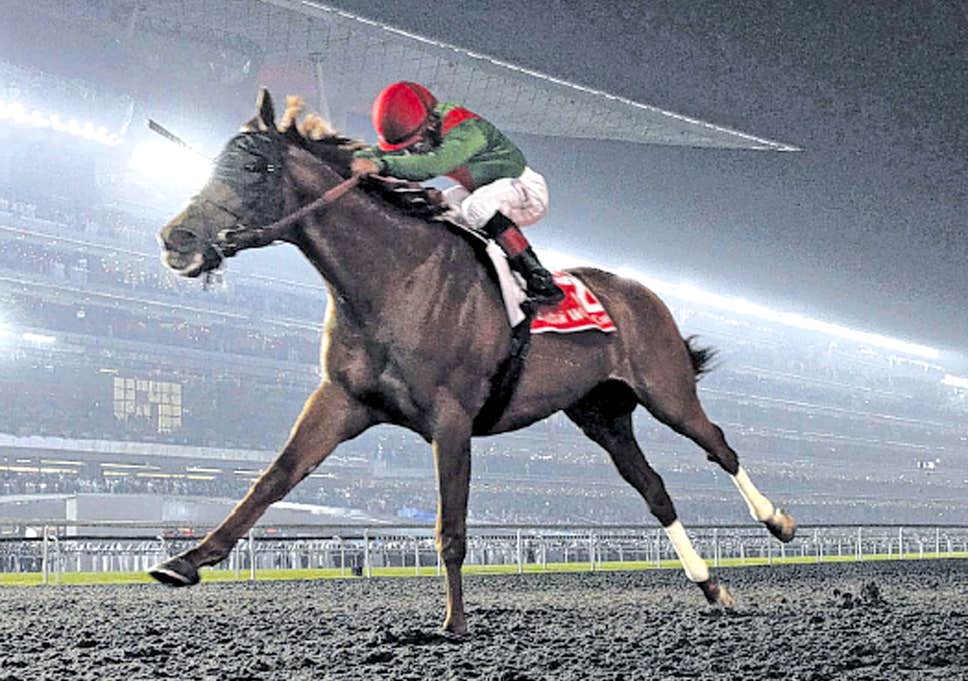True to its billing, as a World Cup, the 18th running of the richest horserace on the planet offered fresh courage and inspiration to those determined that frontiers should no longer be perceived as barriers. Over the past couple of years, they have endured dispiriting retrenchment by insular forces on either side of the Atlantic. In the United States, brave attempts to fill in a moat of drugs and dirt seem to have been defeated, for now, by vested interests. In Britain, meanwhile, momentous opportunity and investment have been dissipated by misapprehensions that seem barely less parochial. The champion who united the attention of both cultures on Saturday, however, offers a wholesome reproof to each.
Animal Kingdom’s stunning performance in Dubai showed American conservatives that even a winner of their most cherished prize can adapt to an environment that redresses welfare concerns raised by their stubborn approach to medication and racing surfaces. Having established his calibre on dirt in the 2011 Kentucky Derby, Animal Kingdom has since achieved equivalent status on turf and now on a synthetic surface. In Dubai, moreover, he proved himself in a jurisdiction that prohibits raceday medication.
He has done all this in the silks of a syndicate headed by one of the most vociferous campaigners for new enlightenment on the American Turf. Barry Irwin is appalled that the organisers of the Breeders’ Cup have meekly yielded to reactionary protests against a proposed drugs clampdown. While themselves embracing the world beyond, with less prohibitive eligibility and costs, they cannot seem to persuade their indigenous professional community to grasp the sort of nettle that might warrant the formal branding of their series as the Thoroughbred World Championships. An experiment with a synthetic surface at Santa Anita, for instance, was hastily abandoned after unprecedented European success there.
As such, Animal Kingdom is a prototype for the 21st-century international thoroughbred. Not only did he stem a tide of disappointment for American raiders, since the World Cup moved from a dirt track at Nad al Sheba to its sumptuous new setting at Meydan, he did so in pursuit of a schedule that flouts timid perimeters. Even his switch to turf, at the last Breeders’ Cup, showed due adventure; and now he is flying to Britain to prepare for Royal Ascot.
Both those departures from convention contain lessons for our own sport, gratified as it is to lure another bona fide superstar. At the Breeders’ Cup, many arrogantly assumed that Excelebration could not have shown his best when third in the Mile. But the winner, Wise Dan, is a Horse of the Year on grass – a very rare distinction, in the United States – while Animal Kingdom would have beaten them both, more or less on the bridle, had he not been caught in traffic. Now that everyone has seen what he can do, with a clear run, perhaps they will accept that Frankel was not alone in being able to make Excelebration look pedestrian.
Excelebration, of course, was nearly unique at Churchill Downs in risking the two-week turnaround demanded by those culpably narrow minds who scheduled Qipco Champions Day at Ascot in direct competition with the Breeders’ Cup.
With both Black Caviar and Animal Kingdom likely to show up, Royal Ascot is confirmed as the proper time and place for international champions to enhance their reputations in Britain. It is nearly impossible to imagine connections of any such horse remotely contemplating a visit to the same track in mid-October. The royal meeting offers all the kudos to redress a congenital deficiency in financial incentives, and also enables elite horses to come here without missing anything else. As it happens, Animal Kingdom is due to start his Australian stud career in September, but any such horse could ordinarily proceed from Dubai to Royal Ascot before being freshened up for the Breeders’ Cup or autumn’s other glittering prizes.
British horsemen are penalised by a sense of obligation to the investment made to keep them on home soil in the autumn. Their eligibility for bigger purses elsewhere was underlined by Red Cadeaux, Planteur and Side Glance, who filled the frame behind Animal Kingdom. Ed Dunlop has harvested many huge prizes abroad with Ouija Board and Snow Fairy, but is surpassing himself with Red Cadeaux. Beaten a nose in the 2011 Melbourne Cup, the veteran gelding remains a bit player on home turf but has won £700,000 and £1.2m in his last two starts, winning in Hong Kong in December and finishing second in Dubai on Saturday. For such a performer, the only stage is all the world.

